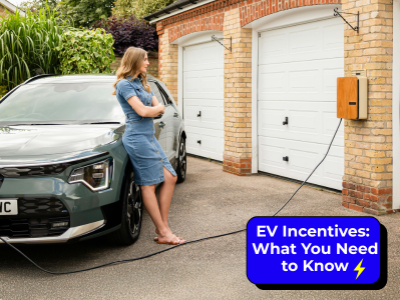
2025 UK Electric Vehicle Incentives: A Simple Guide to What’s on Offer
New Incentives in 2025 Make Electric Cars More Attractive for UK Drivers
Thinking about switching to an electric car this year? 2025 brings several new and continued incentives to help UK drivers make the move to electric vehicles (EVs) — from tax savings to improved charging options.
Here’s a simple guide to what’s on offer right now:
1. Low Tax for Company EV Drivers
If you get a company car, choosing an electric vehicle will save you a lot in tax. The Benefit-in-Kind (BiK) tax for EVs remains at just 2% until April 2028 — much lower than for petrol or diesel cars. That means more money in your pocket.
2. Big Tax Breaks for Businesses
Companies that buy EVs can claim 100% of the cost back against their profits in the first year, thanks to the First Year Allowance (FYA). This scheme runs until March 2026 and helps reduce the cost of switching business fleets to electric.
3. More Public Charging, Easier Installation
The government is investing over £200 million in new public charging stations, especially for residential streets where home charging isn't easy. Local councils are being supported to roll these out.
Also, as of 2025, you no longer need planning permission to install a home EV charger, making it faster and cheaper to get set up at home.
4. Tesco Rewards for Charging
Tesco has launched a new Clubcard charging scheme. When you charge your EV at one of over 600 Tesco stores, you earn Clubcard points — 1 point for every £1 you spend on charging.
You can also earn up to 2,500 extra points by signing up to Pod Point’s EV home charging plan.
5. What’s Changing: New Road Tax for EVs
From April 2025, all new EVs will start paying Vehicle Excise Duty (VED) for the first time:
£10 in the first year
£195 per year after that
Expensive EVs (over £40,000) will pay an extra £390 per year for five years
EVs used to be tax-free, but these changes bring them in line with petrol and diesel vehicles.
6. Things to Keep in Mind: Resale Value
Recent data shows that EVs may lose value faster than petrol or diesel cars. Some EVs keep only about 49% of their value after two years, compared to 70% for traditional cars. So it's worth considering if you plan to sell your car in the near future.
In Summary: Is 2025 the Right Time to Go Electric?
With low company car tax, generous business incentives, expanded charging options, and new retail rewards, 2025 is a strong year for going electric. But with new road tax rules and some concerns over resale values, it’s important to weigh up your options.
Still, if you're looking to save money on running costs and support a cleaner environment, now could be the perfect time to make the switch.

